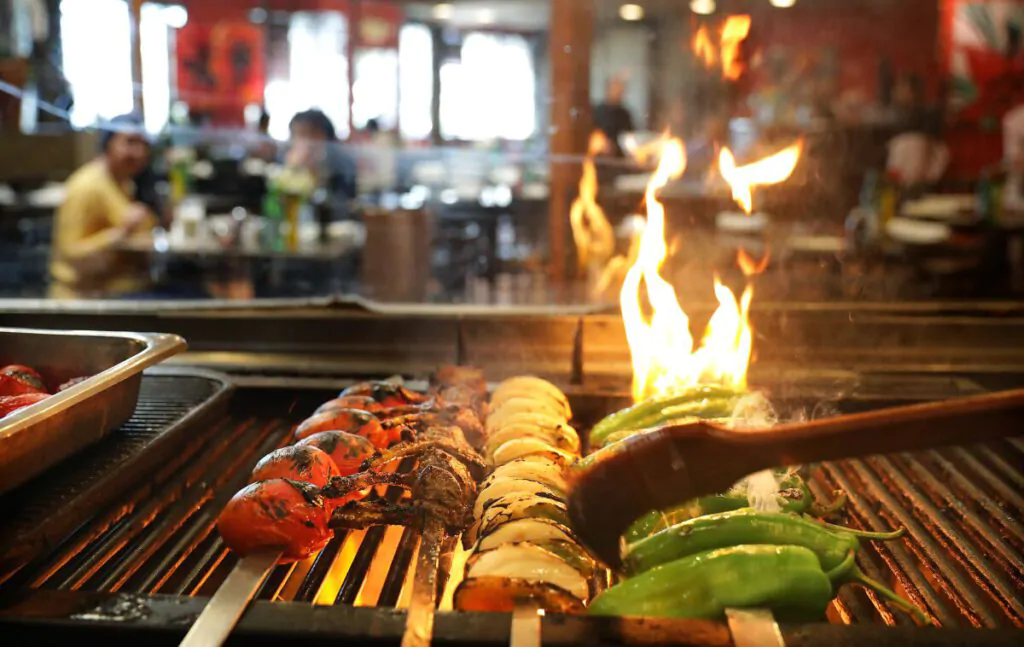The culinary world is vast and constantly changing, influenced by various cultural practices and cuisines. Among these, Iranian cuisine stands out for its remarkable combination of rich and savory dishes. Whether it’s the delicious stews of Fesenjan and Gheymeh, or the aromatic rice dishes of Chelo and Polo, Iranian food has captured people’s hearts (and appetites) worldwide.
In this article of Foodex Magazine, we will explore the stories of some of these remarkable entrepreneurs expanding the horizons of Iranian cuisine. In addition, we will examine the opportunities and challenges these entrepreneurs encounter.
The Rise of Iranian Cuisine
Although Iranian dishes such as Ghormeh sabzi and Chelow kabab are well-known among people worldwide, in recent years, we have witnessed a rise in Iranian cuisine’s popularity, with more and more people discovering the unique ingredients and flavors that make it exceptional. This popularity has also increased attention to Iranian culinary entrepreneurs using their creativity and passion to elevate the food scene.
According to TasteAtlas, Iranian cuisine is recognized as one of the world’s best, achieving a global ranking of 24th in 2022. This ranking is based on many factors, including the popularity and quality of the dishes. Among the top-rated Iranian dishes are Ghormeh Sabzi, Zeytoon Harvard, Jujeh Kabab, Morgh-e Shekalim Por, and Faloodeh. These dishes are favored for their exceptional flavor combinations, use of fresh herbs and spices, and specific traditional cooking techniques.
The Role of Social Media in the Success of Iranian Culinary Entrepreneurs
The growing popularity of Iranian cuisine, fueled in part by the rise of social media, presents a unique opportunity for culinary entrepreneurs within Iran. Social media and online platforms play a crucial role in the success of Iranian culinary entrepreneurs. Iranian food vloggers use these channels to connect with customers, showcase their creations, and share stories about their culinary journey. This digital presence has allowed them to reach a wider audience and garner international recognition.
As more people around the world become familiar with and interested in trying Iranian foods, entrepreneurs can capitalize on this trend by developing innovative culinary concepts that highlight the unique flavors and ingredients of Iranian cuisine.
Modern Persian Cuisine Fusion
One of the most influential innovations brought by Iranian culinary entrepreneurs is the fusion of traditional Persian cuisine with modern techniques and international flavors. This fusion has led to creation of unique dishes that highlight the best aspects of Iranian cuisine while appealing to a broader audience.
Preserving Traditional Iranian Recipes
While Iranian culinary entrepreneurs are pushing the boundaries of Persian cuisine, they also recognize the Importance of preserving traditional recipes. By documenting and sharing these recipes, they ensure that future generations can continue to enjoy the rich flavors and techniques of Iranian cooking.
Innovative Iranian Culinary Entrepreneurs
Over the past few years, Iranian culinary entrepreneurs have significantly influenced the food scene both in Iran and globally. These entrepreneurs have brought their unique mindsets, creativeness, and innovation to the culinary world, presenting new flavors and dishes and challenging our assumptions regarding Iranian cuisine.
Top Iranian Food Entrepreneurs Inside the Country
Here are some of famous Iranian entrepreneurs inside the country:
Javad Modalal
Javad Modalal is a well-known entrepreneur in Kermanshah, Iran, who has established his business in the food industry. He is also known as the father of the Kermanshah industry. The Nazgol vegetable oil factory and the Dalaahoo mineral water company are owned and managed by Javad Modalal and his brother Naser Modalal. The company supplies around 60 to 70 percent of the edible oils produced in Iran.
Shahrokh Zahiri
Shahrokh Zahiri, the father of the modern Iranian culinary industry, is another Iranian food entrepreneur who has impacted the food industry. He founded Mahram, a food company that produces various products such as ice cream, cakes, and cookies. Shahrokh Zahiri started the factory with only 13 employees and Ten million Rials in 1970. It turned it into a successful business that became popular across Iran and even in other countries like the United States.
Ali Khosroshahi
Ali Khosroshahi founded Mino Group, an Iranian company based in Khorramdarreh that produces biscuits, chocolates, medicine, cosmetics, and other products. The company operates as a holding company with several subsidiaries, including Mino Food, which is responsible for producing biscuits and chocolates. Ali Keshvarzshahi is also known for his philanthropy work and has donated millions of dollars to charity.
The Roozchang Brothers
One of Iran’s most prominent food entrepreneurs is the Roozchang brothers, who own the Istak barley malt beverage brand. Istak is produced by the Arpanoosh and Khorsheed Zaryavar companies and is exported to 31 countries worldwide, including the United States, Italy, Germany, Canada, and the United Kingdom.
Gholamali Soleymani
Gholamali Soleymani founded the Kalleh dairy company in Amol, Mazandaran 1990. Kalleh is one of the biggest producers of dairy products in Iran and exports its products to the United States and several other countries, including Iraq, Kuwait, and Azerbaijan.
The Paydari brothers
The Mihan Food Industries complex, founded by the Paydari brothers in Islamshahr, Tehran, is another successful Iranian food business. The complex, which employs more than 14,000 people, is one of the country’s largest producers of ice cream and dairy products and ships its products to several countries in the Middle East.
Ahmad Sadeghian
Ahmad Sadeghian, the founder of the Tak Macaroni Industries company, is another prominent food entrepreneur in Iran. The Tak Macaron enterprise makes a wide range of pasta products. It is the most advanced macaroni factory in the Middle East, making Iran self-dependent in pasta production. In addition to its success in the domestic market, Tak Macaroni Industries also exports its products to other countries.
Behrouz Foroutan
Behrouz Foroutan, the founder of Behrouz Food Industries, is one of Iran’s most successful culinary entrepreneurs. Foroutan started his young entrepreneurial journey, selling goods on the streets to make a living. Today, his company is a leading producer of a wide range of food products, including spices, pickles, and canned foods in Iran, and has reached a network of sales representatives across the country.
Top Iranian Food Entrepreneurs Abroad
Here are some famous Iranian entrepreneurs abroad:
Naz Deravian
Naz Deravian is an Iranian-Canadian author and creator of the award-winning cookbook, “Bottom of the Pot: Persian Recipes and Stories.” Her book celebrates her Iranian heritage and the rich culinary traditions that come with it. Deravian introduces Iranian cuisine to a broader audience through her recipes and stories, showcasing the flavors’ depth and complexity.
Ariana Bundy
Ariana Bundy, an award-winning chef, writer, and television personality, has been prominent in popularizing Persian cuisine globally. Her cookbooks, such as “Pomegranates & Roses” and “Sweet Alternative,” have introduced readers to the pleasures of Iranian cuisine.
Sabrina Ghayour
Sabrina Ghayour is a renowned chef and restaurateur who has brought Iranian cuisine to the forefront of the food industry. Her restaurants, including the well-known “Berber & Q” in London, showcase the bold flavors of Iranian cuisine in a modern and innovative manner. Ghayour’s dishes combine traditional Iranian techniques and ingredients with a modern twist, making them appealing to a more general audience.
Samin Nosrat
Samin Nosrat, an Iranian-American chef and writer, has significantly impacted the culinary world with her book “Salt, Fat, Acid, Heat” and the subsequent Netflix series. Her approach to cooking has inspired many to explore the possibilities of Persian cuisine.
Hoss Zaré
Hoss Zaré is an Iranian-American chef and entrepreneur known for his innovative approach to Iranian cuisine. He owns “Zaré at Fly Trap” in San Francisco, a restaurant showcasing Iranian cuisine’s diverse flavors. Zaré’s dishes are a fusion of traditional Iranian ingredients and modern techniques, resulting in a unique and exciting dining experience.
Najmieh Batmanglij
Najmieh Batmanglij, also known as the “guru of Persian cuisine,” is a prominent cookbook writer and culinary teacher. Her cookbooks, such as “Food of Life” and “From Persia to Napa,” have helped spread Iranian culinary practices across the globe.
Nasim Alikhani
Nasim Alikhani is an Iranian-American chef and writer devoted to sharing the flavors of her heritage with people around the world. Her cookbook, “Bottom of the Pot: Persian Recipes and Stories,” celebrates Iranian cuisine and the stories that come with it. Alikhani’s dishes are created with a unique and innovative approach that has captivated food lovers worldwide.
Behzad Jamshidi
Behzad Jamshidi is an Iranian food blogger and influencer using social media to showcase the diversity and beauty of Iranian cuisine. Jamshidi introduces his followers to traditional Iranian dishes and modern interpretations through his blog and social media platforms. His approach to food is both creative and educational, making him a valuable voice in the Iranian culinary scene.
Challenges Faced by Iranian Culinary Entrepreneurs
Despite their successes, Iranian culinary entrepreneurs face various challenges, such as:
- Political Tensions,
- Cultural Misunderstandings, Stereotypes, and Misconceptions
- Difficulties in Sourcing Authentic Ingredients
- Limited Access to Financing
- High Operating Costs
- Legal and Regulatory Barriers
- Competition
- and Limited Market Access due to Sanctions and restrictions on international trade
Despite these challenges, Iranian culinary entrepreneurs have demonstrated remarkable resilience and creativity in overcoming obstacles and achieving success.
Supporting Local Iranian Food Businesses
Supporting local Iranian food businesses is essential for sustaining their growth and preserving their culinary traditions. By choosing to dine at Iranian restaurants, purchasing ingredients from Iranian markets, and attending Iranian food events, consumers can contribute to the success of these entrepreneurs.
The Future of Iranian Culinary Entrepreneurship
With a new generation of Iranian chefs and entrepreneurs at the wheel, the future of Iranian cuisine looks bright. These individuals are preserving the traditional recipes that have been passed down for generations and coming up with fresh approaches and techniques.
As the popularity of Iranian cuisine continues to grow, we anticipate witnessing even more creativity and innovation in the years to come.
Conclusion
In this article, we have explored some of the most prominent Iranian culinary entrepreneurs inside and outside the country who have made significant contributions to the industry. We have also examined the substantial opportunities and challenges faced by these entrepreneurs.
Iranian culinary entrepreneurs‘ work reflects their creativity, innovation, and entrepreneurship. It has paved the way for the globalization of Iranian cuisine and inspires aspiring culinary entrepreneurs, and their contribution to the food industry is worth celebrating and recognizing.



















